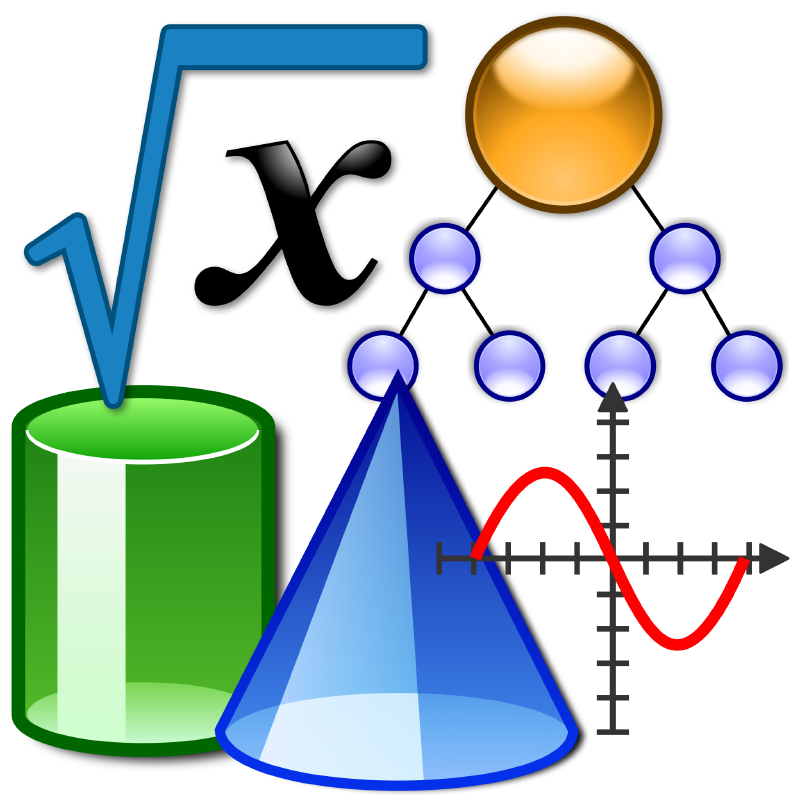Cover image credit: File:Nuvola Math and Inf by Vojtěch Pikal is licensed under CC0 1.0.
Technical subjects such as Mathematics tend to confuse a lot of people. This confusion results in many of us being turned off by such subjects at a very young age as we think that we’re not smart enough to master this subject. This is truly unfortunate as not only do we deny ourselves the opportunity to develop an appreciation for this beautiful subject – really, an Art form, as I’ll argue below – but Math also has many practical applications in daily life, which we miss out on mastering due to our phobia of the subject. One such area in everyday life where Math can be productively applied is that of personal finance, where a decent handle on some basic Math is more than sufficient to gain effective insights into your personal financial situation.
A lot of trepidation towards Math arises from not really getting the definitions of technical terms used in this subject. Technical subjects such as Math tend to use a lot of technical terms, a.k.a. “technical jargon”, to succinctly capture core concepts. For example, the term “squaring” in arithmetic refers to “multiplying a number by itself”. So, instead of saying, “5 multiplied by itself gives 25”, you can say, “5 squared is 25”1 – a more brief description of the same fact.
In this case, using the term “squaring” may seem like a small win as we saved only 2 words instead of spelling out what it actually means in terms of multiplication. But there are many other mathematical terms that result in dramatically reducing verbosity. Take for example, the term “factorial”, denoted by “!”. The expression “1000!” is shorthand for 1000 multiplied by 999 multiplied by 998, and so on, all the way to multiplication by 1, which results in a number that has 2,568 digits! As you can see, using this term can result in some seriously impressive space savings. It is often said that a picture is worth a 1000 words, but when it comes to Math, it’s not an exaggeration to say that (pun intended)
Mathematical statements can be worth 1000! words
In order to understand and truly appreciate Math, there is no way around really comprehending its terminology. Often, the technical meaning of a word or phrase in Math is very different from its everyday meaning.
By the way, what’s true for Math is also true for Finance – another technical subject. For example, the term “net worth”, which is one of the fundamental quantities in finance, is the difference between what you own and what you owe. This has nothing to do with your worth as an individual, for example, to your family or society, even though it sounds like it does.
As another home-grown example, we’ll often talk quantitatively about money in our blog posts2. So, it’s unavoidable to use some units of currency to complete the description of how much money we’re talking about. However, different countries in the world use different currencies. So, in order to keep our writings accessible to everyone around the globe, we’ll use the invented term “local currency units” (LCU) to denote monetary quantities. When reading our posts, you should translate LCU to the local currency of your home country, e.g., in India, LCU stands for INR, in US, it stands for USD, in Europe, it stands for EUR, in Canada for CAD, etc.
In colloquial language, we use the same word in different ways and its meaning is often understood through its context. Furthermore sometimes, the same word is used to convey two different meanings within the same statement, a.k.a. a pun, and this gives a language its richness (e.g., see the pun above). On the other hand, a technical term in a Mathematical statement always has the same meaning no matter the context3. It is for this reason why you’ll find that in Math, there’s a great emphasis on defining terms very carefully as compared to colloquial languages. In a way,
precisely defining terms is one of the defining features of the language of Mathematics!
In fact, Math can be thought of as a language in its own right, and can be appreciated just like other Art forms, such as literature. We believe that one of the main difficulties in truly appreciating Math as an Art form is due to the fact that we usually try to understand it using colloquial language, which is grossly ill-equipped to plumb the depths of this beautiful subject.
It’s like trying to appreciate poetry using only pictures – it just doesn’t work!
In order to truly appreciate Math, it’s imperative to have a good understanding of the basic building blocks of this language, viz., its terminology, and try to understand the subject through its own language, rather than relying on colloquial language. An additional side benefit of this approach towards Math is that it eliminates the need to master a language that may not be your mother tongue, e.g., English, in order to develop a deep understanding of this beautiful subject.
We believe that if you follow this approach, you’ll soon see that Math is actually much more straightforward than what is popularly believed, and you don’t really need to be very smart to get it!
-
which can be further expanded as “add 5 to itself, 5 times in total” ↩︎
-
After all, it is a blog about using basic Math to understand personal Finance. ↩︎
-
To be precise, technical terms have an unambiguous meaning within a given field of Math, e.g., algebra or geometry, but the same term may have different meanings in different fields. ↩︎
